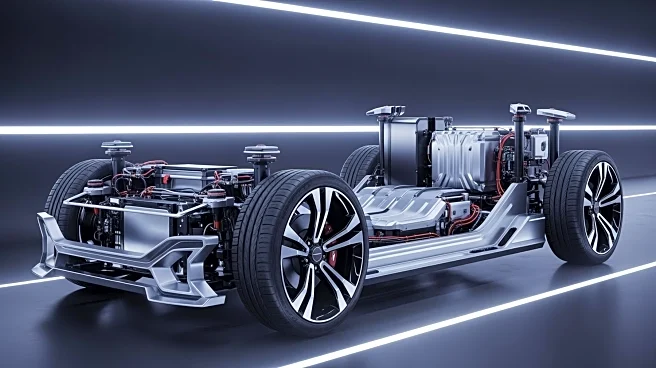What's Happening?
At the SEMA 2025 event, THUNK introduced its innovative 'THUNK3' in-tunnel drive unit, designed specifically for Tesla Model 3/Y conversions. This compact unit features a 300-horsepower motor and a 3:1 planetary gearbox, facilitating seamless integration
into internal combustion engine (ICE) to electric vehicle (EV) conversions. The design allows for additional space in the engine bay, accommodating high-voltage batteries, and presents a cost-effective alternative to existing tunnel drives. The unveiling highlights a growing demand in the aftermarket for practical solutions in EV conversions. Toyota and GM also showcased their advancements, with Toyota revealing high-powered Corolla EV and bZ Time Attack concepts, while GM faced challenges to match these performance ambitions in future models.
Why It's Important?
The introduction of THUNK's Model 3 tunnel drive unit signifies a pivotal shift in the automotive industry towards more accessible and efficient EV conversion solutions. This development is crucial as it addresses the increasing consumer demand for affordable and practical EV options, potentially accelerating the transition from ICE vehicles to electric ones. The innovations presented by major automakers like Toyota and GM at SEMA 2025 further emphasize the industry's commitment to enhancing EV performance and design. This trend could lead to broader adoption of electric vehicles, impacting environmental sustainability and reducing reliance on fossil fuels.
What's Next?
The automotive industry is likely to see increased competition among manufacturers and aftermarket companies to develop more efficient and cost-effective EV conversion technologies. As consumer interest in electric vehicles grows, automakers may prioritize the integration of advanced EV features in their future models. Additionally, regulatory bodies might implement policies to support the transition to electric vehicles, potentially offering incentives for EV conversions. Stakeholders, including environmental groups and industry leaders, will closely monitor these developments to assess their impact on sustainability goals and market dynamics.
Beyond the Headlines
The advancements in EV conversion technology could have significant ethical and cultural implications. As the industry moves towards electrification, there may be a shift in consumer attitudes towards sustainability and environmental responsibility. This transition could also influence urban planning and infrastructure development, as cities adapt to accommodate increased EV usage. Furthermore, the focus on EV conversions might lead to discussions about the lifecycle impact of electric vehicles, including battery disposal and resource management.















